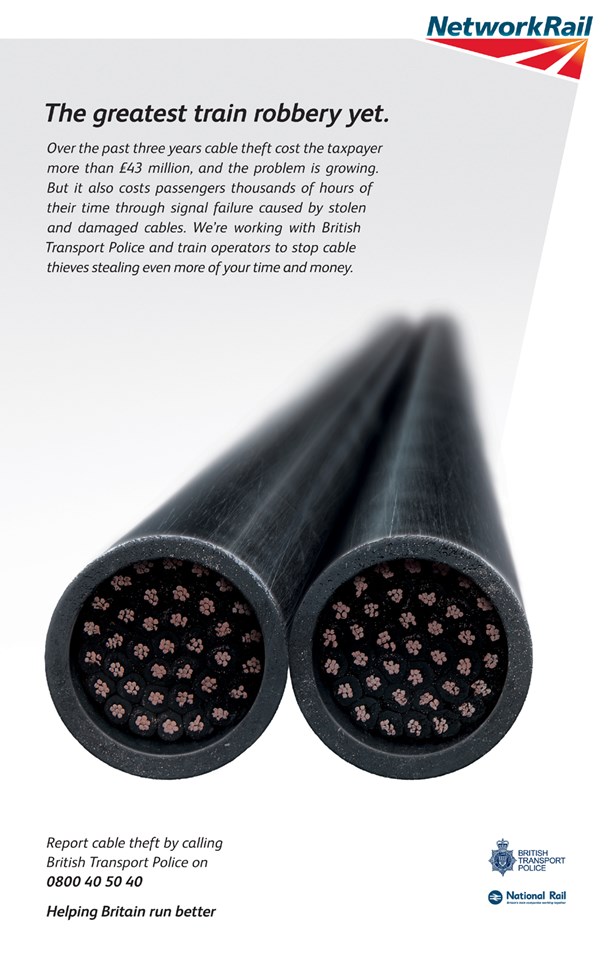Monday 30 Apr 2012
SOUTH WEST TRAINS AND NETWORK RAIL ALLIANCE CALLS FOR SCRAP LEGISLATION REFORM AS CABLE THEFT CAUSES INCREASED PASSENGER MISERY IN WESSEX
- Region & Route:
- | Southern: Wessex
- | Southern
- Crimes in Wessex increase by more than 50% on previous year
- Disruption to passengers in Wessex more than 18,000mins
- Full legislative reform believed to be only way to stem the tide
Full legislative reform is believed to be needed to stop the cost and misery caused by cable thieves in the Wessex area as the latest figures show the cost and delays to passengers continue to rise.
Crimes for the financial year 2011/12 have increased to 13 from eight the previous year. The incidents cost the industry, and ultimately the taxpayer and passengers, nearly £800,000 in the last 12 months and delayed passengers by 18,443 minutes. In 2010/11 those figures were £140,423 in compensation and delays of 3,536 minutes.
Commenting on behalf of the South West Trains and Network Rail alliance, managing director Tim Shoveller said: “Crimes and delay to passengers have both increased in the last year and are at an unacceptably high level. We firmly believe that without legal reform we will continue to see thousands of hours delay to passengers and pay millions of pounds in compensation dealing with these crimes.”
The government has indicated that cash transactions for scrap will be outlawed. However Network Rail and the wider rail industry are united in calling for full reform of the 1964 Scrap Metal Dealers Act. This needs to include:
- an updated, fully funded licensing scheme to replace the voluntary registration currently in place.
- magistrates should also have the power to impose restrictions upon, and ultimately enforce the closure of, yards that fail to keep to the law.
- police powers to enter, inspect and if necessary close scrap dealers are essential. At present they may only enter registered premises with a warrant.
- a requirement for scrap metal dealers to require proof of identity and to keep adequate records about their customers.
- Additional requirements on itinerant metal dealers’ vehicle licences to enable those operating outside the law to be impounded.
Network Rail has invested millions of pounds protecting key locations and funding extra British Transport Police officers. This has combined with public support in reporting criminals and improved sentencing in courts.
Tim Shoveller added, “We are grateful for the public support we continue to receive in reporting suspicious activity – both on the railway and at disreputable scrap dealers. We will continue to do all we can to stop these thieves but it is clear the law needs substantial change in order to take away the easy market for illegal scrap.”
Tony Berkeley, chairman of the Rail Freight Group said “Cable theft continues to cause major delay to freight trains on a daily basis. Although this doesn’t often hit the headlines in the way that passenger delays do, it is causing significant problems for freight operators and their customers who include national retailers, power generators and construction companies. The cost of disruption is significant and impacts on their businesses, their employees, and ultimately the whole UK economy.
“We are pleased that UK Government has taken the first steps in tackling cable theft, alongside the continued efforts of the rail industry. But further action will be required if the impacts of cable theft are to be eliminated.”
Assistant chief constable Alan Pacey, of British Transport Police, added: “BTP is committed to tackling metal theft, particularly those thefts which have a direct impact on the running of the railway.
“We have officers dedicated to dealing with metal theft and, during 2011, arrested more than 1,000 people in connection with these crimes. In the past few months convicted metal thieves have been jailed for a total of more than 58 years thanks to British Transport Police investigations.
“We will continue to disrupt and detect thieves who target the railway and will not hesitate to put them before the courts and seek the strongest possible sanctions.”
Notes to editors
Compensation costs (known as schedule 8 costs) are paid to train and freight operators for the disruption caused by the delay. This payment is to reimburse the operators who pay in advance for access to the track which the theft has prevented; to cover additional staff and other costs and to reimburse passengers who have been affected. This is a substantial part of the cost to the industry of cable theft but does not include the cost of staff time to repair and replace the cable, replacement cable itself and the cost of mitigation measures such as security patrols and investment in new technology. The amount of compensation paid depends on the type of services delayed.
Contact information
Passengers / community members
Network Rail national helpline
03457 11 41 41
Latest travel advice
Please visit National Rail Enquiries
Journalists
Network Rail press office - South East route
020 3357 7969
southeastroutecomms@networkrail.co.uk
About Network Rail
We own, operate and develop Britain's railway infrastructure; that's 20,000 miles of track, 30,000 bridges, tunnels and viaducts and the thousands of signals, level crossings and stations. We run 20 of the UK's largest stations while all the others, over 2,500, are run by the country's train operating companies.
Usually, there are almost five million journeys made in the UK and over 600 freight trains run on the network. People depend on Britain's railway for their daily commute, to visit friends and loved ones and to get them home safe every day. Our role is to deliver a safe and reliable railway, so we carefully manage and deliver thousands of projects every year that form part of the multi-billion pound Railway Upgrade Plan, to grow and expand the nation's railway network to respond to the tremendous growth and demand the railway has experienced - a doubling of passenger journeys over the past 20 years.
Follow us on Twitter: @networkrail
Visit our online newsroom: www.networkrailmediacentre.co.uk

